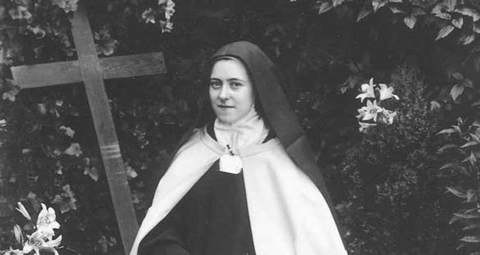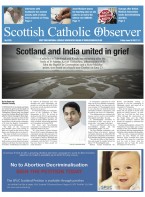February 5 | ![]() 0 COMMENTS
0 COMMENTS ![]() print
print

A shirt of flame
Fr Ronald Rolheiser
They say that the book you most need to read finds you when you most need to read it. I’ve had that experience many times, most recently with Heather King’s book, Shirt of Flame, A Year with Saint Therese of Lisieux.
The title of the book is borrowed from TS Eliot’s Four Quartets, where he famously suggests that Love itself, God, is behind the torment we often feel in our fiery desires and that the burning we feel there is an ‘intolerable shirt of flame.’
Ms King writes this book from a fiery context within her own life: She is a freelance journalist and writer, single, divorced, an alcoholic in recovery, reconciling some darkness in her past, dealing with a paralysing obsession because the man she is in love with will not respond to her, risking the financial stability of a career in law for the insecurity of being a free-lance writer, and struggling with the sense of being an outsider to normal family, marriage, and community, an orphan at all the banquets of life. And so she sets off for a year to immerse herself in one of the most intriguing saints of all time, Therese of Lisieux, in an attempt is to see whether Therese might be a moral and spiritual compass by which to sort out her own life. The result is a powerful, deeply insightful, adult, book.
Ms King recognises in Therese’s soul, inside the soul of a saint, inside someone who could seemingly give up everything for God, the same fiery desires that she feels within her own soul. And she recognises too that those fires can both purify or destroy, redeem or torment, turn someone into a great saint or a great sinner. So she lets Therese’s fire shed light on her own fires. And since what is most personal and private inside of us, if revealed, is also the most universal, by revealing her own deep, private struggles, her book sheds light on the universal human struggle. However, the book is self-revealing but never exhibitionist, a tricky formula that she handles well.
For example, drawing upon a famous incident in Therese’s life when as a little girl, asked by her older sister who presented her with a velvet sewing-basket full of color balls to pick one thing from a basket, Therese said: “I choose all!” and took the entire basket and walked away. Ms King reflects upon her own struggle to, as Kierkegaard said, will the one thing: Here’s the parallel she draws to her own life”: “’I choose all!’ said Therese, and the further I progressed, the more I saw that the human dilemma is to want it all. I wanted to be celibate, and I wanted wantonly to give myself to a spouse, I wanted dark secrets, noise, lights, mania, and the stimulation of a city, and I wanted to plant a garden, tend animals, and live on a farm. I wanted to live in the same place all my life, and I wanted to travel every inch of the globe before I died. I wanted to sit utterly still, and I was also driven to be constantly on the move. I wanted to be hidden and anonymous, and I wanted to be famous. I wanted to be close to my family, and I wanted to leave my family behind. I wanted to devote my life to activism, and I wanted to devote my life to contemplation. I wanted to give everything to God, and I didn’t know how! I longed to give my undivided self, and I couldn’t!”
Reflecting on Therese’s vow of poverty, Ms King writes: “Poverty is never, never voluntary. Poverty consists precisely in all the ways you absolutely don’t want to be poor.” Drawing upon the German poet, Gertrud von le Fort who wrote that when her soul was most in anguish everything around her in effect said: “But you are nothing!”, Ms King writes: “At last someone had told my story. For the last ten years especially, I had been in anguish and ‘they’—my husband, the person I loved, the legal profession, the medical profession when I had cancer, the publishing industry—had said in so many words: ‘But you are nothing.’ Everywhere I turned: a blank wall. Everything I had hoped for: ashes. Everything I had worked for: ‘But you are nothing’. … One morning in the shower, I wept to Christ: ‘I don’t love you and you don’t love me either!’” We’ve all been there.
If you are struggling with faith, with brokenness in your life, with an obsession, with an addiction, with a gnawing sense that your life is not what it should be, with the sense of being the outsider, an orphan at all the banquets of life, and, most of all, with the sense you don’t love Jesus and he doesn’t love you either, that you are nothing, then let this book find you. It’s a book for those who think they might be too sick to be helped by a doctor.
— Fr Ronald Rolheiser is a priest and member of the Missionary Oblates of Mary Immaculate. He is president of the Oblate School of Theology in San Antonio, Texas. Visit his website at www.ronrolheiser.com











